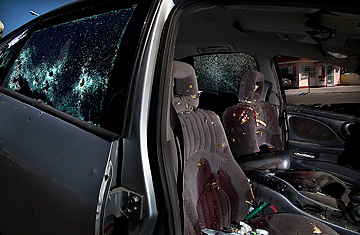
A car shot up in a Juárez gun battle
(2 of 4)
A Criminal Insurgency
It has been more than four years since Calderón started a military campaign against spiraling drug savagery, backed by a $1.5 billion pledge of U.S. aid. The cartels — there are at least six major gangs and several smaller outfits — reacted by unleashing a wave of violence, fighting for turf. Calderón insists this shows the gangs are rattled, but his critics say his strategy has often made matters worse. Drug lords are now engaged in an arms race, firing everything from assault rifles to rocket-propelled grenades at the army, police, rival gangsters and any civilians who get in their way. The military has scored some victories, taking out the leaders of a few cartels, but even those successes usually spawn new, more vicious power struggles. The carnage now threatens the fledgling democracy and growing economy of one of the U.S.'s most important trade and security partners. Secretary of State Hillary Rodham Clinton has gone so far as to describe the cartels as a criminal "insurgency" that seeks not to overthrow the Mexican government but rather to keep it under its blood-soaked thumb.
The U.S. helped create this beast. According to the White House Office of National Drug Control Policy, Americans consume $65 billion worth of illegal drugs annually, roughly what they spend on higher education, and most of those drugs are either produced in Mexico or transit through it. The U.S. is also a primary source of the weapons the cartels use to unleash their mayhem: the Bureau of Alcohol, Tobacco, Firearms and Explosives estimates that 70% of the guns seized in Mexico in the past two years were smuggled from north of the border. "The current flow of weapons," Mexico's ambassador to the U.S., Arturo Sarukhán, charged last year, "provides the drug syndicates with their firepower."
Calderón's war against the cartels may have been poorly thought through, but a succession of U.S. Presidents has pursued equally ineffectual policies. Since President Richard Nixon declared a "war on drugs" 40 years ago this summer, Washington has opted for a sweeping policy of incarcerating drug offenders at home and eradicating drug sources abroad. The Obama Administration has begun to balance law enforcement with more drug-rehab-oriented policies that reduce demand, but it dismisses the recent suggestion of several Latin American leaders to legalize arguably less harmful drugs like marijuana. Such a move might put a serious crimp in drug-cartel finances, but the White House says it would "make it harder to keep our communities healthy and safe." However the legalization debate goes, the U.S. could at the very least do more to help Mexico develop modern investigative police forces in addition to sending high-tech helicopters to Calderón's army.
Mexicans don't hold out much hope for constructive help from their northern neighbor. They realize that making their communities safe again means pressuring their politicians to get serious for once about the rule of law — about ensuring that powerful criminals and the officials who protect them are brought to justice in a timely way in a legal system that has a broad measure of public confidence. That is far from the case now. The corruption watchdog Transparency International estimates that Mexicans paid $2.75 billion in bribes to police and other officials last year. Meanwhile, 95% of violent crimes in Mexico go unsolved.
There are plenty of examples of governments that have driven out, or at least greatly diminished, once dominant criminal gangs. Perhaps the most appropriate example is Colombia, where powerful cartels have been cut down in the past two decades thanks largely to the professionalization of the police and judiciary. Calderón himself knows his military campaign is not enough. In May he repeated his long-term goal of "judicial institutions that Mexico has too long lacked and without which the advance of criminals is understandable — and a future for Mexico is incomprehensible."
But the time for lofty rhetoric is long past. Measured in lives claimed, the level of violence in Mexico now surpasses that in Afghanistan or Pakistan. And the drug lords are engaged in a macabre competition to ratchet up the gore. Groups like the Zetas are fond of posting Internet videos of the prolonged torture and murder of their enemies. One top investigator tells me that the cartels wage bidding wars for the services of the best butchers and surgeons to perform beheadings of murdered rivals. The craniums are triumphantly displayed in town plazas like Halloween decorations.
Drug thugs killed by their competitors are easily replaced. In a country where most workers earn less than $10 a day, the cartels have little difficulty recruiting new legions. The Chihuahua state attorney general estimates that close to 10,000 Mexicans work for drug cartels in Juárez alone, not least because even foot soldiers can earn hundreds of dollars a week as sicarios, or triggermen.
